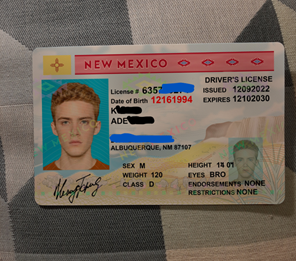Share this @internewscast.com
EL PASO, Texas (Border Report) – Authorities have shut down two internet domains and a blog used for selling fraudulent identity documents, including fake New Mexico driver’s licenses.
The FBI in 2022 began investigating a company called Verif.tools allegedly involved in a conspiracy to steal cryptocurrency accounts.
A Netherlands-based company purportedly offered fake passports, driver’s licenses, and other IDs for prices starting at $8.99. The FBI utilized this Verif.tools marketplace to create and purchase counterfeit New Mexico driver’s licenses using cryptocurrency. The agency disclosed it has pinpointed approximately $6.4 million in illegal earnings linked to Verif.tools.
On August 27, the Rotterdam Police Cybercrime Team raided an Amsterdam data center and secured two physical data servers and 21 virtual servers.
Simultaneously, the FBI took the platform offline.

“The internet is not a sanctuary for criminals. If you create or sell tools enabling offenders to impersonate victims, you are complicit in the crime,” stated Acting U.S. Attorney for the District of New Mexico Ryan Ellison. “We will employ every legal method to disrupt your operations, confiscate your profits, and bring you to justice.”
The exact number of fake New Mexico driver’s licenses sold remains unknown. Verif.tools also provided fraudulent passports from various countries in Europe, Africa and Mexico, as per images released by Dutch authorities.
“Taking down this marketplace is a significant step toward shielding the public from fraud and identity theft,” stated Philip Russell, Acting Special Agent in Charge of the FBI Albuquerque Division. “Alongside our partners, we remain committed to targeting and dismantling the platforms that criminals rely on, regardless of their location.”

A detailed report by Dutch authorities highlighted that Verif.tools was among the largest platforms for fabricating images of fake IDs. Its clientele included those seeking a new identity or disguising their identities for activities ranging from bank fraud and phishing to underage bar entry.
Users found the platform via multiple access points on the internet, uploaded photos, entered false information, and then generated the desired fake ID.

Rotterdam police said all data on the servers has been secured and copied. Dutch authorities are trying to identify company operators and don’t rule out future arrests.
The operators face up to six years in prison if caught and convicted in the Netherlands.














